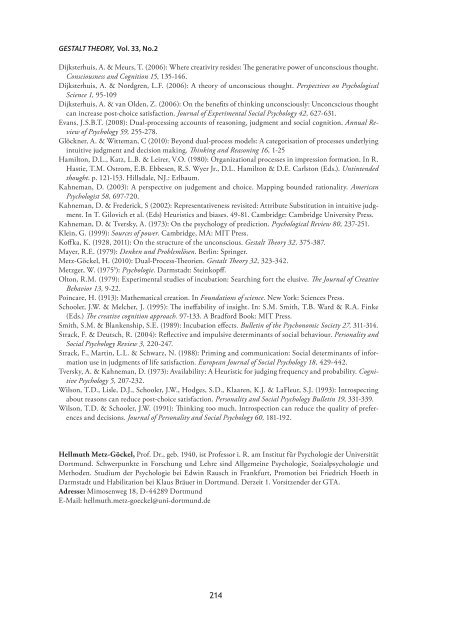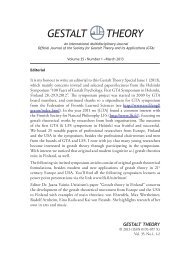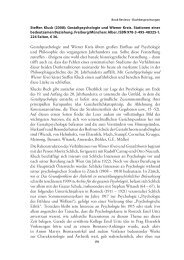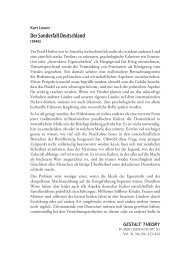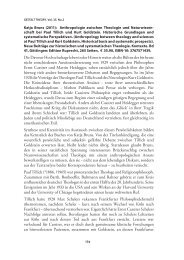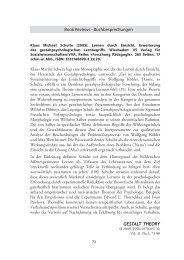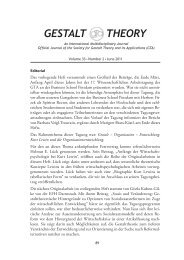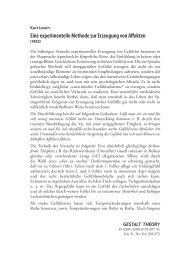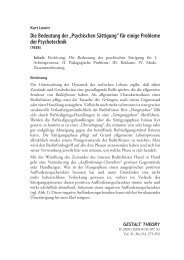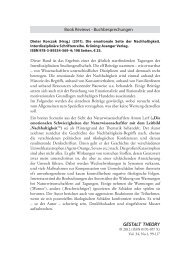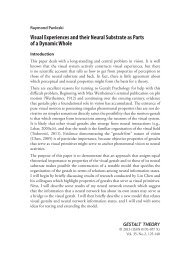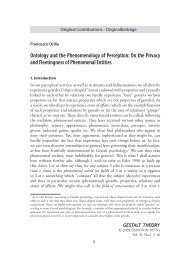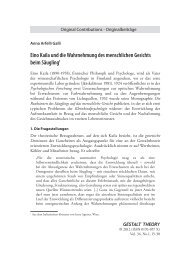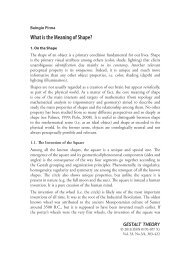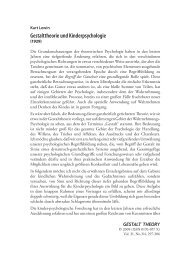Dual-Process-Theorien: Neuere Untersuchungen ... - Gestalt Theory
Dual-Process-Theorien: Neuere Untersuchungen ... - Gestalt Theory
Dual-Process-Theorien: Neuere Untersuchungen ... - Gestalt Theory
Erfolgreiche ePaper selbst erstellen
Machen Sie aus Ihren PDF Publikationen ein blätterbares Flipbook mit unserer einzigartigen Google optimierten e-Paper Software.
GESTALT THEORY, Vol. 33, No.2<br />
Dijksterhuis, A. & Meurs, T. (2006): Where creativity resides: The generative power of unconscious thought.<br />
Consciousness and Cognition 15, 135-146.<br />
Dijksterhuis, A. & Nordgren, L.F. (2006): A theory of unconscious thought. Perspectives on Psychological<br />
Science 1, 95-109<br />
Dijksterhuis, A. & van Olden, Z. (2006): On the benefits of thinking unconsciously: Unconcscious thought<br />
can increase post-choice satisfaction. Journal of Experimental Social Psychology 42, 627-631.<br />
Evans, J.S.B.T. (2008): <strong>Dual</strong>-processing accounts of reasoning, judgment and social cognition. Annual Review<br />
of Psychology 59, 255-278.<br />
Glöckner, A. & Witteman, C (2010): Beyond dual-process models: A categorisation of processes underlying<br />
intuitive judgment and decision making. Thinking and Reasoning 16, 1-25<br />
Hamilton, D.L., Katz, L.B. & Leirer, V.O. (1980): Organizational processes in impression formation. In R.<br />
Hastie, T.M. Ostrom, E.B. Ebbesen, R.S. Wyer Jr., D.L. Hamilton & D.E. Carlston (Eds.). Untintended<br />
thought. p. 121-153. Hillsdale, NJ.: Erlbaum.<br />
Kahneman, D. (2003): A perspective on judgement and choice. Mapping bounded rationality. American<br />
Psychologist 58, 697-720.<br />
Kahneman, D. & Frederick, S (2002): Representativeness revisited: Attribute Substitution in intuitive judgment.<br />
In T. Gilovich et al. (Eds) Heuristics and biases. 49-81. Cambridge: Cambridge University Press.<br />
Kahneman, D. & Tversky, A. (1973): On the psychology of prediction. Psychological Review 80, 237-251.<br />
Klein, G. (1999): Sources of power. Cambridge, MA: MIT Press.<br />
Koffka, K. (1928, 2011): On the structure of the unconscious. <strong>Gestalt</strong> <strong>Theory</strong> 32, 375-387.<br />
Mayer, R.E. (1979): Denken und Problemlösen. Berlin: Springer.<br />
Metz-Göckel, H. (2010): <strong>Dual</strong>-<strong>Process</strong>-<strong>Theorien</strong>. <strong>Gestalt</strong> <strong>Theory</strong> 32, 323-342.<br />
Metzger, W. (1975 5 ): Psychologie. Darmstadt: Steinkopff.<br />
Olton, R.M. (1979): Experimental studies of incubation: Searching fort the elusive. The Journal of Creative<br />
Behavior 13, 9-22.<br />
Poincare, H. (1913): Mathematical creation. In Foundations of science. New York: Sciences Press.<br />
Schooler, J.W. & Melcher, J. (1995): The ineffability of insight. In: S.M. Smith, T.B. Ward & R.A. Finke<br />
(Eds.) The creative cognition approach. 97-133. A Bradford Book: MIT Press.<br />
Smith, S.M. & Blankenship, S.E. (1989): Incubation effects. Bulletin of the Psychonomic Society 27, 311-314.<br />
Strack, F. & Deutsch, R. (2004): Reflective and impulsive determinants of social behaviour. Personality and<br />
Social Psychology Review 3, 220-247.<br />
Strack, F., Martin, L.L. & Schwarz, N. (1988): Priming and communication: Social determinants of information<br />
use in judgments of life satisfaction. European Journal of Social Psychology 18, 429-442.<br />
Tversky, A. & Kahneman, D. (1973): Availability: A Heuristic for judging frequency and probability. Cognitive<br />
Psychology 5, 207-232.<br />
Wilson, T.D., Lisle, D.J., Schooler, J.W., Hodges, S.D., Klaaren, K.J. & LaFleur, S.J. (1993): Introspecting<br />
about reasons can reduce post-choice satisfaction. Personality and Social Psychology Bulletin 19, 331-339.<br />
Wilson, T.D. & Schooler, J.W. (1991): Thinking too much. Introspection can reduce the quality of preferences<br />
and decisions. Journal of Personality and Social Psychology 60, 181-192.<br />
Hellmuth Metz-Göckel, Prof. Dr., geb. 1940, ist Professor i. R. am Institut für Psychologie der Universität<br />
Dortmund. Schwerpunkte in Forschung und Lehre sind Allgemeine Psychologie, Sozialpsychologie und<br />
Methoden. Studium der Psychologie bei Edwin Rausch in Frankfurt, Promotion bei Friedrich Hoeth in<br />
Darmstadt und Habilitation bei Klaus Bräuer in Dortmund. Derzeit 1. Vorsitzender der GTA.<br />
Adresse: Mimosenweg 18, D-44289 Dortmund<br />
E-Mail: hellmuth.metz-goeckel@uni-dortmund.de<br />
214


